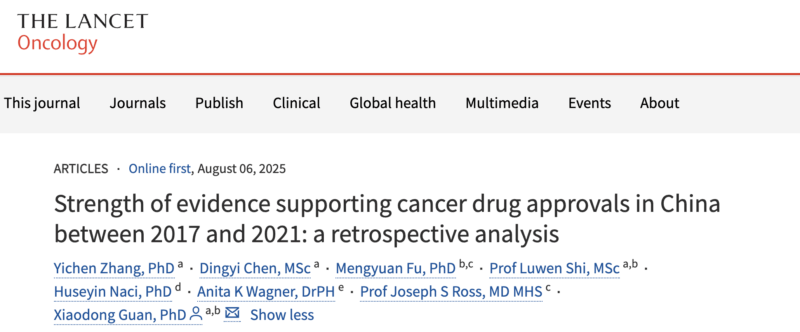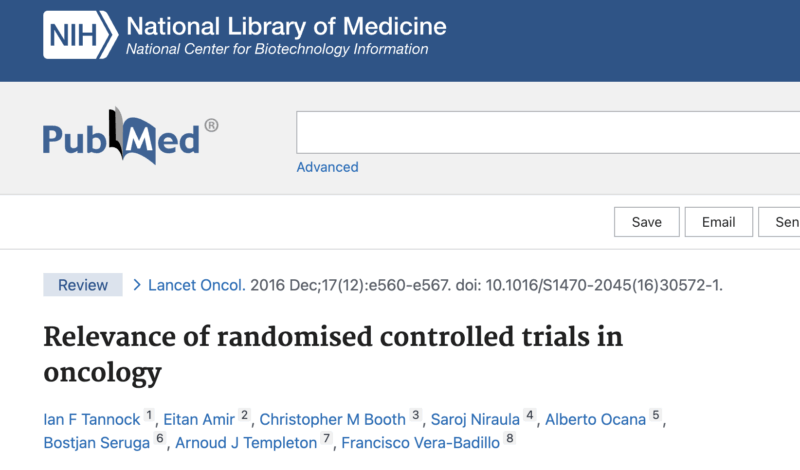
Miguel Bronchud: Cancer Drugs Approval in China – Looking Bright But With Room for Improvement?
Miguel Bronchud, Co-Founder and Advisory Board at Regenerative Medicine Solutions, shared on LinkedIn:
“Cancer Drugs Approval in China- looking bright but with room for improvement?
In a classic review on the importance of randomized clinical trials (RCT) for drug approval, Ian Tannock and colleagues insist on: Relevance of randomised controlled trials in oncology
Ian F Tannock et al. Lancet Oncol. 2016 Dec.
Well designed and executed randomised controlled trials (RCTs) can prevent bias in the comparison of treatments and provide a sound basis for changes in clinical practice.
However, the design and reporting of many RCTs can render their results of little relevance to clinical practice.
In their classic “Personal View”, these highly respected and quoted authors discuss the limitations of RCT data and suggest some ways to improve the clinical relevance of RCTs in the everyday management of patients with cancer.
RCTs should ask questions of clinical rather than commercial interest, avoid non-validated surrogate endpoints in registration trials, and have entry criteria that allow inclusion of all patients who are fit to receive treatment.
Furthermore, RCTs should be reported with complete accounting of frequency and management of toxicities, and with strict guidelines to ensure freedom from bias.
Premature reporting of results should be avoided. The bar for clinical benefit should be raised for drug registration, which should require publication and review of mature data from RCTs, post-marketing health outcome studies, and value-based pricing.
A different but directly relevant issue is also addressed :
The Lancet Oncology. Drug approval by regulators: who watches the watchers? Lancet Oncol. 2016 Dec;17(12):1621. doi: 10.1016/S1470-2045(16)30595-2. PMID: 27924743.
China is experiencing – following an unprecedented investment boom in pre clinical and clinical research- a major surge in biotechnology and pharmaceutical research.
In a very recently published The Lancet retrospective analysis, authors – funded by National Natural Science Foundation of China- searched publicly available data from the National Medical Products Administration website to identify pivotal pre-approval efficacy trials supporting all original and supplemental cancer drug indications approved in China from Jan 1, 2017, to Dec 31, 2021.
Title: Strength of evidence supporting cancer drug approvals in China between 2017 and 2021: a retrospective analysis
Authors: Yichen Zhang, Dingyi Chen, Mengyuan Fu, Luwen Shi, Huseyin Naci, Anita Wagner, Joseph Ross, Xiaodong Guan
Read The Full Article The Lancet Oncology.

They included small molecules and biologics, and excluded traditional Chinese medicines, prophylactic vaccines, and generic or biosimilar versions of previously approved drugs.
Authors collected trial protocols and publications from ClinicalTrials.gov, PubMed, and the China National Knowledge Infrastructure database.
The primary outcome was the strength of the supporting pivotal studies, as measured by study design (randomised or single-arm) and quality.”
Title: Relevance of randomised controlled trials in oncology
Authors: Ian Tannock, Eitan Amir, Christopher Booth, Saroj Niraula, Alberto Ocana, Bostjan Seruga, Arnoud Templeton, Francisco Vera-Badillo
Read The Full Article at National Library of Medicine.

More posts featuring Miguel Bronchud on OncoDaily.
-
Challenging the Status Quo in Colorectal Cancer 2024
December 6-8, 2024
-
ESMO 2024 Congress
September 13-17, 2024
-
ASCO Annual Meeting
May 30 - June 4, 2024
-
Yvonne Award 2024
May 31, 2024
-
OncoThon 2024, Online
Feb. 15, 2024
-
Global Summit on War & Cancer 2023, Online
Dec. 14-16, 2023
